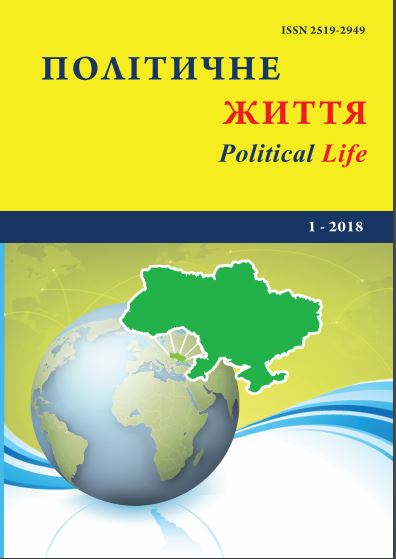Migration as an object of political research.
DOI:
https://doi.org/10.31558/2519-2949.2018.1.1Keywords:
migration, types of migration, factors of influence, theoretical models of analysis of migration processes, migration consequences, donor countries, recipient countriesAbstract
In the article the author examines the theoretical principles of the study of migration processes in the context of state policy, whose influence determines the dynamics of scales, directions, intensity of migration. The approaches to the definition of «migration», «migration mobility» and «migration mobility» are analyzed. It is established that migration processes in terms of content, causes and consequences have sources and various forms of manifestation in almost all spheres of human and social life, are studied in different contexts and at different levels. The article deals with the classification of types of migration according to such classification features as geographic direction, direction of movement, duration of stay, legal status, purpose, causes, way of involvement. On the basis of the analysis of scientific works, functions (accelerating, selective, redistribution of labor force, population development, economic, reproductive, social) and factors influencing migration of the population (economic, social, cultural, political and environmental) are singled out. The theoretical models of the analysis of migration processes are systematized, which are expediently divided into two groups: the theory considering the factors and causes of migration (neoclassical economic theory, neoclassical microeconomic theory , the concept of the spatial self-organization of the population, the concept of a new economy of labor migration) and the theory that focuses on the analysis of self-development mechanisms and self-support for migration (the theory of social cap Italy, the theory of migratory networks D. Massey, the theory of the total causal condition D. Massey, the sociological theory of risks, the institutional theory, the theory of three stages of the migration process). It has been established that for different countries and regions, the consequences of migration can be different, both for those who give the labor force and those who accept it. The article presents the positive and negative effects of migration for donor countries and recipient countries.References
Беккер Г.С. Человеческое поведение: экономический подход. Избранные труды по экономической теории: Пер. с англ. / Г.С. Беккер. – М.: ГУВШЭ, 2003. – 672 с.
Борута І. Міграційне право ЄС / І. Борута. – К.: Вид-во ІМВ КНУ ім. Т. Шевченка. – 130 с.
Економічна енциклопедія: У трьох томах. Т. 2 / Редкол.: С.В. Мочерний (відп. ред.) та ін. – К.: Видавничий центр «Академія», 2001. – 848 с.
Зовнішні трудові міграції населення України / За ред. Е.М. Лібанової, О.В. Позняка. – К.: РВПС України НАН України, 2002. – 206 с.
Ионцев В.А. Международная миграция населения: теория и история изучения / В.А. Ионцев. – М.: Диалог, МГУ, 1999. – 370 с.
Майер Дж.М. Основні проблеми економіки розвитку / Дж.М. Майер, Дж.Е. Раух, А. Філіпенко. – К.: Либідь, 2003. – 688 с.
Малиновська О.А. Мігранти, міграція та Українська держава: аналіз управління зовнішніми міграціями: Монографія / О.А. Малиновська. – К.: Вид-во НАДУ, 2004. – 123 с.
Міграційні процеси в сучасному світі: світовий, регіональний, національний виміри / За ред. Ю. Римаренко. – К.: Довіра, 1998. – 912 с.
Міграційні процеси в Україні: сучасний стан і перспективи. / За ред. О.В. Позняка. – Умань, 2007. – 276 с.
Міжнародна економіка: підручник / Д.Г. Лук’яненко, А.М. Поручник, Я.М. Столярчук. – К.: КНЕУ, 2014. – 762 с.
Моисеенко В.М. Миграция как объект комплексного исследования / В.М. Моисеенко // Народонаселение: современное состояние и перспективы развития научного звания. – М.: МГУ. – 1997. – С. 23-30.
Полянська Я.Л. Проблеми і наслідки міграції в Україні / Я.Л. Полянська // Регіональні аспекти розвитку і розміщення продуктивних сил України. – Тернопіль: Економічна думка. – 2004. – С. 74-77.
Практическая демография / Под ред. Л.Л. Рыбаковского. – М.: ЦСП, 2005. – 280 с.
Романюк М.Д. Міграції населення України за умов перехідної економіки: Методологія і практика регулювання / М.Д. Романюк. – Львів: Світ, 1999. – 292 с.
Рощин С.Ю. Экономика труда: экономическая теория труда: Учебное пособие / С.Ю. Рощин, Т.О. Разумова. – М.: ИНФА–М, 2001. – 400 с.
Рыбаковский Л.Л. Миграция населения: прогнозы, факторы, политика / Л.Л. Рыбаковский. – М.: Наука, 1987. – 200 с.
Слюсаревський М.М. Психологія міграції / М.М. Слюсаревський, О.Є. Блинова. – Кіровоград: ТОВ «Імекс ЛТД», 2013. – 244 с.
Советский энциклопедический словарь / Гл. ред. А.М. Прохоров. – М.: Сов. энциклопедия, 1988. – 1600 с.
Столярчук Я. Сучасна сегментація та ключові тенденції розвитку світового ринку праці / Я. Столярчук, С. Поручник // Україна: аспекти праці. – 2014. – № 7. – С. 12-17.
Хомра А. У. Миграция населения: вопросы теории, методики исследования / А.У. Хомра. – К.: Наукова думка, 1979. – 148 с.
Geist B. Sociologicky slovnik / B. Geist. – 1992. – 580 p.
Harris J.R. Migration, unemployment, and development: A two – sector analysis / J.R. Harris, Michael P. Todaro // American Economic Review. – 1970. – № 60. – P. 126-142.
Mincer J. Schooling: Experience and Earnings / J. Mincer. – N.Y., 1974.
Rogers A. Introduction to My ciltiregional Mathematical Demography / A. Rogers. – New York: Unify – Interscience publications, 1975. – 203 p.
Sassen S. Losing control? Sovereignty in an Age of Globalization / S. Sassen. – N.Y.: Columbiya Univ. Press, 1996. – 148 p.

